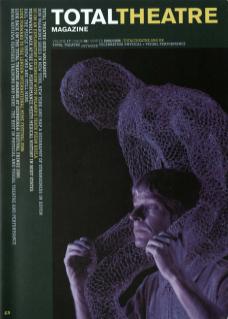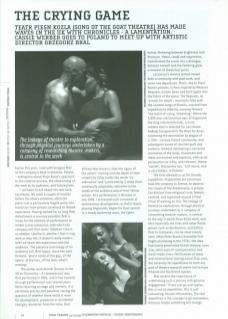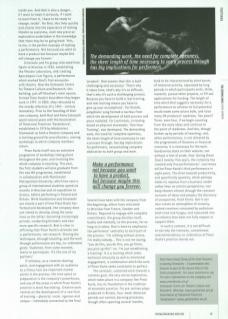Earlier this year, I met with Grzegorz Bral at the company's base in Wroclaw, Poland – asking him about Pieśń Kozła's approach to the creative process, the relationship of the work to its audience, and future plans.
I am keen to ask about the new work, Lacrimosa. We meet a couple of months before the show's premiere, when the piece is at a particularly fragile point; the transition from private construct to shared experience. Having worked for so long that detachment is scarcely possible, Bral is ready for the alchemy of performance to render a new substance, with which the company will then work: 'Whether I like it or whether I dislike it, whether I feel it may work or may not, it doesn't really matter... Until we share this experience with the audience. The presence and energy of an audience will, Bral hopes, move the work forward, 'give a sense of the gap, of the space, of the loss of the lack, what's missing’.
The earlier work Kroniki (known in the UK as Chronicles – A Lamentation) was first performed in 2001, and it has evolved through performance over several years. While retaining an edge and rawness, it is extremely precise and polished, raising the question of whether there really is room for development, purposive or accidental changes, deviation from the rules. Bral affirms that there is – that the rigour of the actors' training and the depth of their complicity (they prefer the words 'coordination' and 'synchronicity') make them continually adaptable, sensitive to the needs of the audience and of their fellow artists. At a performance in Wroclaw in July 2004, I witnessed such a moment of spontaneous development; as Rafal Habel, playing Gilgamesh, began his final speech in a slowly darkening room, the lights failed, flickering between brightness and blackout. Habel, ready and responsive, transformed the scene into a dialogue between himself and the faltering glow, a moment of theatrical purity.
Lacrimosa's diverse stimuli reveal both a continuity with past work, and some new departures. Music, key to Pieśń Kozła's process, is here inspired by Mozart's Requiem, broken down and built again into the fabric of the piece. The Requiem, as 'a mass for death', maintains links with the visceral songs of Kroniki, sourced from expedition to Albania, carrying forward 'the motif of crying, lamenting'. Where the 5000 year old Sumerian epic of Gilgamesh the King informed Kroniki, a more modern text is selected for Lacrimosa: Andrzej Szczypiorski's The Mass for Arras, examining the decimation by plague of a 15th Century French community, and subsequent waves of reactive guilt and violence. Without attempting a narrative recreation of the book, characters and ideas are excised and explored, with racial persecution as a key, and relevant, theme: 'Racism,' Bral points out, 'still exists, and is very hidden, in Poland.’
The final element is, as for Kroniki, expedition. Preparation for Lacrimosa took the company to Greece, to observe the rituals of the Anastenaria, a private (as distinct from religious) cult; female-centred, and organised around a final ritual of walking on fire. The linkage of theatre to exploration, through physical journeys undertaken by a company of researching theatre-makers, is central to the way in which Pieśń Kozła work, and here especially the links with other Polish groups such as Gardzienice, and before that to Grotowski, can be most clearly seen. When Peter Brook's Ensemble first began journeying in the 1970s, the idea had barely penetrated British theatre; even now, when ease of communication and travel make cross-fertilisation of ideas and international touring easier than ever, the necessity for expeditions to form any part of theatre research seems not to have filtered into the British system.
Bral asserts the importance of undertaking such a journey with genuine engagement: 'If you just go and voyeur, this is not an expedition, this is just consuming, tourist information. The real expedition is the courage to go somewhere, because maybe something will change inside you. And that is also a danger... if I want to treat it seriously, if I want to learn from it, I have to be ready to change, inside.’ For Bral, this links quickly and clearly into the experience of making theatre as a process, each new piece of exploration undertaken in the knowledge that there may be no going back: 'this, to me, is the perfect example of making a performance. Not because you want to have a product but because maybe this will change you forever.'
Grotowski and his group relocated from Opole to Wroclaw in 1965, establishing the Theatre Laboratory, and creating Apocalypsis Cum Figuris; a performance which marked Bral's first encounter with theatre. Now the Grotowski Centre for Theatre Culture and Research, this building, just off Wroclaw's main square, formed Pieśń Kozła's base when they began work in 1997. In 2002, they relocated to the nearby refectory of a 14th Century monastery. Prior to the founding of their own company, both Bral and Anna Zubrzycki spent several years with the Association of Theatrical Practices 'Gardzienice', established in 1976 by Wlodzimierz Staniewski as both a theatre company and a training ground for practitioners, running workshops to which company members return.
Pieśń Kozła itself runs an extensive programme of workshops taking place throughout the year, and involving the whole company in teaching. This year, the first students will also graduate from the new MA programme, established in collaboration with Manchester Metropolitan University, which has seen a group of International students spend six months in Wroclaw and on expedition to Greece, before performing in Poland and Britain. While Gardzienice and Grotowski are clearly a part of how Pieśń Kozła has formed and developed, the company does not intend to develop along the same lines as the latter, becoming increasingly private, conducting hermetic and ever more specific research. Bral is clear in affirming that Pieśń Kozła's ultimate aim is performance, not research. Sharing the techniques, through teaching, and the work through performance are key, coordinated goals: 'Audience, from some moment, starts to participate. It's like one of my partners.’
If stimulus, as a creative starting point, and engagement with an audience as a litmus test are important marker points in the process, the time spent on preparation is the company's powerhouse, and one of the areas in which Pieśń Kozła's practice is most fascinating. Creative work centres on the development of a new form of training – physical, vocal, rigorous and unique – intimately connected to the final 'product'. Bral asserts that this is both challenging and necessary: ‘That's why it takes time, that's why it's so difficult, that's why it's such a challenging process. Because you have to build a real training, and real training means you have to give up your assumptions.’ For Kroniki, polyphonic song formed a nucleus from which the development of both process and piece radiated. For Lacrimosa, a training based on physical movement, 'One Hour Training', was developed. The demanding work, the need for complete openness, the sheer length of time necessary to see a process through, has big implications for performers, necessitating complete dedication to both group and work.
Several have been with the company from the beginning; others have relocated to Wroclaw from France, Sweden and Britain. Required to engage with complete commitment, the group devotes itself, bodily and mentally, to the process, for as long as it takes. Bral is keen to emphasise the performers' centrality to each part of the process: 'I'm nothing without actors, I'm really nobody... This is not me saying, "you do this, you do this, you go there, you pick up this" – no. I'm just establishing a training.’ It is a training which seeks technical virtuosity as well as emotional engagement, a combination which the work of Pieśń Kozła seeks constantly to perfect.
The constant, sustained work towards a common goal, the very active exploration which takes place in a company like Pieśń Kozła, has its foundation in the tradition of ensemble practice. For pre-written plays produced in Britain, four-week rehearsal periods are normal; devising processes, though often spanning several months, tend to be characterised by short bursts of intensive activity, separated by long periods in which participants write, think, research pursue other projects, or fill out applications for funding. The length of time which Bral suggests is necessary for a performance to achieve its full potential would make some actors balk, and raise many UK producers' eyebrows. Two years? Three, even four, if we begin counting from the early ideas and continue to the point of readiness. And this, though broken up by periods of teaching, rest, other performances, is not dictated by the programmes of theatres or financial concerns; it is necessary for the work. Gardzienice state on their website, not without a hint of pride, that ‘during these [last] twenty-five years, the company has created only five performances'. Lacrimosa will be Pieśń Kozła's third performance in eight years. The drive towards productivity, and specifically quantity, which perhaps takes its impetus from a business model rather than an artistic perspective, can keep theatre vibrant through the constant turnover of ideas and people; the discovery of unexpected, fresh forms. But it can also create an atmosphere of voracity, rushed creations consumed by audiences both tired and hungry, and subsumed into an industry that does not fully respect or support them.
In such a context, it is not difficult to see why the intensity, commitment and extraordinary coordination of Pieśń Kozła's practice stands out.
Teatr Pieśń Kozła (Song of the Goat Theatre) is touring Chronicles – A Lamentation this autumn as part of the Aurora Nova in the South programme. See www.auroranova.org
For more information on the company see www.pieskozla.art.pl
Grotowski Centre for Theatre Culture and Research, Wroclaur www.grotcentre.art.pl
Association of Theatrical Practices Gardrienice: www.gardzienice.art.pl


